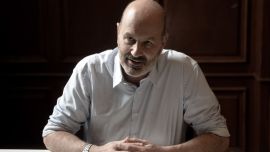Top government officials are preparing to visit China in the next few weeks as President Javier Milei ditches his aggressive rhetoric against Beijing in a bid to deepen ties with a key trade partner.
Central Bank Governor Santiago Bausili will be part of a large delegation visiting the Asian country in the coming weeks, according to a person with direct knowledge of the trip who asked not to be named discussing sensitive matters.
He’ll be preceded by Foreign Minister Diana Mondino, whose trip is scheduled for the end of April.
Mondino announced her travel plans after meeting with the Chinese ambassador to Argentina, Wang Wei, on April 8.
Details of the trips are still not finalised, but among the pressing issues in the bilateral agenda is an US$18-billion currency swap between Argentina’s monetary authority and the People’s Bank of China. Argentina needs to renew this year roughly US$5 billion from that line after former economy minister Sergio Massa used the funds largely to finance imports in 2023.
Bausili and Economy Minister Luis Caputo are in Washington for the International Monetary Fund’s spring meetings. They met with Deputy Managing Director Gita Gopinath earlier Thursday, as Argentina considers requesting fresh funds from the IMF.
China’s swap is the largest source of foreign reserves in Argentina’s Central Bank, whose debts are currently larger than its assets. It’s become the biggest yuan swap line in the world, at a time when China has been using them in several countries to expand its global influence.
On the campaign trail, Milei raised questions about the future of Argentina’s relations with the Asian giant if elected, calling the Chinese “assassins” and “communists.” In an April 4 interview with Bloomberg News, however, the president adopted a much more pragmatic tone, avoiding incendiary remarks and assuring he wouldn’t touch the currency swaps.
“They are commercial agreements between private parties,” he said. “We have one part in our Central Bank, they have their counterpart in their central bank. Therefore, that’s not a problem.”
Another potential point of conflict is a space station maintained by China in the Patagonia region, considered by the United States as a threat to itself and its allies. But Milei, who in the past questioned the purpose of the station, said in the same interview he would negotiate with the Chinese to inspect it.
“We are going to study the situation,” Milei said. “That also isn’t a problem.”
Chinese trade and investment drive large swathes of Argentina’s economy, ranging from commodities and energy to banking. That remains true even after the country reined in some of its foreign investment during a market rout. China is the second-biggest buyer of Argentina’s exports, behind only Brazil, and its main source of imports.
by María Elena Vizcaino & Manuela Tobias, Bloomberg




















Comments